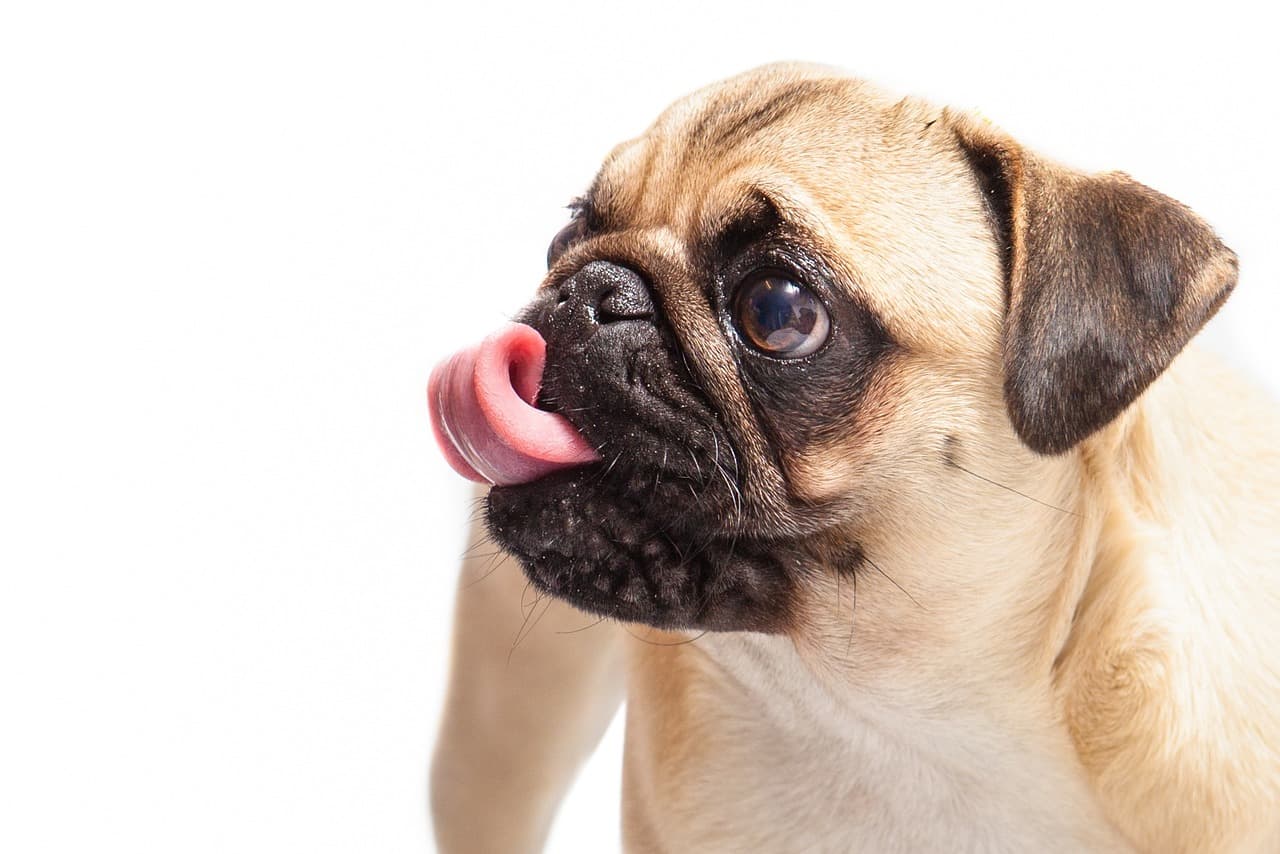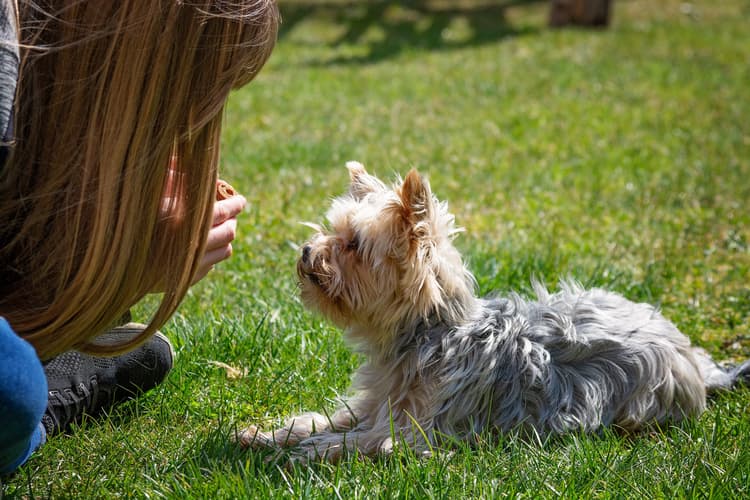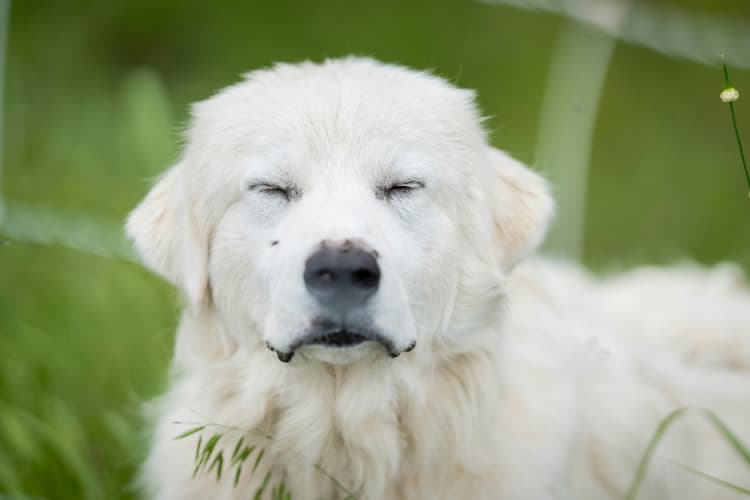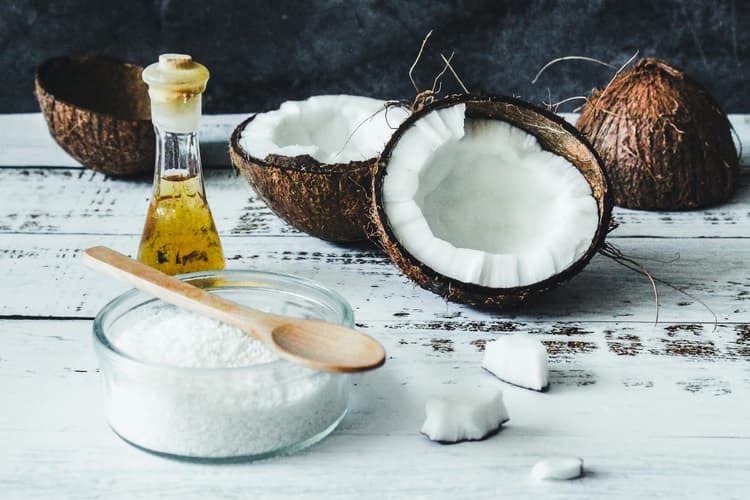Introduction: Is Your Dog Licking Everything?
It can be a bit unsettling to watch your pup constantly licking everything in sight. But don’t worry — most of the time, the answer to “Why is my dog licking everything?” lies in completely normal canine behavior. Licking is a natural way for dogs to explore their surroundings and express affection.
However, in some cases, excessive licking may point to underlying physical or emotional issues.
In this guide, we explore 11 possible reasons behind your dog’s licking behavior—from simple curiosity and love to more serious concerns. Our goal is to help you identify the root cause, so you’ll know when it’s time to consult your vet.

Why Is My Dog Licking Everything? Normal Reasons Dogs Lick Things
1. Exploration and Curiosity
To understand the science behind canine licking behavior, let’s first understand a dog’s sense of smell. According to experts, dogs have over 300 million olfactory receptors in their noses, compared to the measly 6 million receptors in human noses! This means that when your dog licks something, they're not just tasting it — they're also gathering a wealth of information through scent. In a way, dogs use their tongues to "taste" the world around them.
Young dogs and highly intelligent, energetic breeds are especially likely to explore their environment this way. When a puppy, or your curious Golden Retriever, licks your hands, they're essentially reading a diary of your day, learning where you’ve been and what you’ve encountered.
2. Affection and Bonding
Another straightforward answer to the question “Why is my dog licking everything?” is that your pup is expressing love and affection. Licking is a natural canine behavior that helps release endorphins, promoting a sense of calm and relaxation. It’s also a key way dogs communicate with one another, essentially, it’s their version of social bonding.
Humans often reinforce this behavior without realizing it — by petting, praising, or speaking affectionately when a dog licks. This positive feedback encourages the dog to continue licking as a way to connect and seek attention.
3. Taste and Crumbs
Does your dog lick you after a sweaty workout? Dogs love the taste of our salty sweat. They are usually food-motivated and love to lick their humans, other pets, or even the floor or furniture to taste whatever food flavor is on those surfaces. They may lick the kitchen counters or dining table to get the food crumbs humans have left behind.
When Licking Becomes Excessive or Compulsive
4. Licking Furniture, Floors, or Walls
If your dog is licking floors, walls, or furniture, it could be due to boredom, a desire for attention, or an attempt to self-soothe. The repetitive licking motion releases endorphins, which can help dogs feel more relaxed — especially in stressful or anxious situations. This behavior is often seen in dogs prone to separation anxiety or those with a history of trauma, such as rescue or shelter dogs.
In some cases, excessive licking can also be a learned or instinctual habit. Puppies may pick it up by observing their mother or littermates. Licking is a natural behavior in dogs, often used for grooming, self-soothing, or even aiding in wound healing.
5. Licking People Obsessively
When a dog frequently licks their owner or other human family members, it’s often a sign of attention-seeking behavior. What may begin as a loving gesture can quickly turn into a habit — especially if the owner unknowingly reinforces it by offering praise, affection, or treats in response. Over time, the dog learns that licking is an effective way to get attention or even food.
As mentioned earlier, licking can also be a self-soothing behavior. It helps release calming endorphins and may provide comfort during moments of stress or anxiety. This type of licking is particularly common in dogs with separation anxiety or strong emotional attachments to their humans.
6. Licking Themselves Constantly
According to PetMD, excessive licking, grooming, or chewing of their skin may be a sign of underlying health issues in dogs. This behavior can indicate allergies, skin infections, parasites, or even pain and discomfort in a specific area.
Allergies
Skin allergies are one of the most common reasons behind excessive licking in dogs. Your dog could be reacting to a variety of allergens, including certain foods, pollen, dust, mold, hay, mites, flea saliva, or even household products like detergents and cleaners. Dogs with allergies often focus their licking on specific areas, such as their paws or belly.
In some cases, identifying the allergen can be challenging, as symptoms may not appear immediately or can be mistaken for other issues. If you suspect allergies, it’s best to consult your vet for proper diagnosis and treatment.
Pain
A dog may lick excessively as a way to soothe or relieve pain in a specific area that's causing discomfort. This behavior can be a response to various types of pain, including:
Injuries or wounds – Bites or stings from insects, cuts, burns, sprains, or even fractures can lead a dog to lick the affected area in an attempt to heal or ease the pain.
Arthritis – Common in older dogs, arthritis causes joint pain and stiffness, often prompting dogs to lick the painful joints.
Gastrointestinal (GI) issues – Conditions like an upset stomach, acid reflux, or other digestive problems can create internal discomfort. Dogs may respond by licking objects or themselves in an effort to self-soothe.
Dental problems – Poor oral health, broken or missing teeth, and gum disease can cause pain and excessive drooling. In response, dogs may lick frequently to cope with the discomfort.
Hunger or Malnourishment
Dogs often lick their lips when they are hungry or starving. Licking lips is a sign that your dog is anticipating food or treats.
Skin issues
External parasites like fleas, ticks, mites, and mange can also cause itching that may trigger the dog's excessive licking behavior. Is your dog constantly licking their paws? It could be due to the growth of fungal or bacterial microbes in the region that makes the skin itchy. Dogs with dry skin may try to relieve the itching by licking themselves constantly.
Watch out for signs of sores, blisters, oozing or bleeding skin, hair loss, and redness or discoloration of the skin. If these signs are present, please have your pet examined by the vet.

Medical Reasons Your Dog Might Be Licking Everything
7. Gastrointestinal Issues
Various gastrointestinal (GI) problems — such as an upset stomach, pancreatitis, inflammatory bowel disease (IBD), or other digestive abnormalities — can lead to nausea, which may trigger excessive licking in dogs. This licking is often a coping mechanism to relieve discomfort. Be on the lookout for symptoms like excessive drooling, a tucked tail, loss of appetite, vomiting, diarrhea, or signs of abdominal pain. If you notice any of these, it’s important to consult your vet promptly.
Licky Fits Some dogs, particularly certain breeds like the Greater Swiss Mountain Dog, are prone to a condition known as "lick fits" or "licky fits." Dogs experiencing this will lick frantically — carpets, floors, walls, or even the air. While the exact cause is still unclear, it's believed that gastrointestinal issues, such as excess stomach gas or acid reflux, may trigger these episodes. Lick fits are more commonly seen in younger dogs and may require medical evaluation to rule out underlying GI problems.
8. Neurological or Cognitive Disorders
Neurological conditions like canine cognitive dysfunction (seen in older dogs, akin to dementia in humans), brain tumors, spinal diseases, obsessive-compulsive disorder, and focal seizures can also trigger excessive licking in dogs. Such dogs may need medication or surgery to resolve the issue.
9.Pica
Sometimes, dogs may lick rusty metal objects or other non-food items due to underlying nutritional deficiencies or a condition known as pica. Pica is characterized by the compulsive ingestion or licking of non-edible substances and can be triggered by a range of factors, including:
Nutritional imbalances or malnourishment
Internal parasites
Thyroid disorders
Boredom or lack of mental stimulation
Anxiety or stress
Emotional or Behavioral Causes
10. Anxiety and Stress
Stress from separation anxiety, fear, trauma, or routine changes can trigger licking in dogs. Like humans who fidget when anxious, dogs use licking to self-soothe. The repetitive motion helps them calm down by releasing feel-good endorphins.
11. Boredom or Understimulation
All dogs, regardless of size, need daily mental and physical activity to stay healthy and happy. Without it, they can become bored, anxious, or restless. Working and hunting breeds, in particular, are wired for constant activity and may struggle with a sedentary lifestyle. In such cases, dogs might lick their paws to release calming endorphins or simply to keep themselves occupied.
How to Manage Excessive Licking in Your Dog
Identify the Root Cause
As a concerned dog owner, you may want to keep an eye on your dog and journal when the licking occurs. This can help you determine whether the root cause of the behavior is physical or emotional. Always rule out any medical issues first by speaking to your vet.
Here is a quick reference table on “Why Dogs Lick Everything.”
Where or What They Lick | Possible Cause | Normal or Concerning | Action to Take |
Furniture | Food/anxiety or boredom/medical issue | Could be both | Clean the furniture, provide mental and physical stimulation to the dog, and rule out health issues |
People | Affection and bonding, tasting salt from sweaty skin | Usually normal unless it is obsessive | Set boundaries and use positive reinforcement training (reward the dog for calm behavior) |
Self, paws, and belly area | Allergies, health issues, and nausea due to GI issues, irritation, and pain | Concerning when the behavior results in a lick granuloma, redness, or oozing skin. | See the vet to rule out health issues |
Air or walls | Anxiety, stress, boredom, nausea, pica, stomach upset, attention-seeking, GI or dental issues, dog compulsive licking behavior, neurological problems, etc. | Usually concerning | See your vet to determine the exact medical cause. |
Random objects | Exploration, boredom, pica | Usually normal, especially in puppies, but can be concerning if it is excessive. | Provide mental and physical stimulation, chew toys, and teething toys to pups. Monitor the behavior and speak to the vet if it is obsessive. |
Provide Mental and Physical Stimulation
A tired dog is a happy, well-behaved dog. Make sure your pet — especially young puppies and high-energy breeds — gets plenty of mental and physical exercise. This could include multiple short walks, games of fetch, or interactive play in the yard. At home, use toys, puzzle feeders, and enrichment games to keep their minds engaged. Training sessions and active play can also help channel a puppy’s energy in a positive direction and prevent unwanted behaviors like excessive licking.
Use Positive Reinforcement and Redirection
To prevent dogs from licking people, use positive reinforcement training. This includes rewarding the dog when they greet people calmly. You can also command your dog to sit, stay, or greet people with a paw bump or head bump instead of licking.
Never punish or scold your dog for licking, as that can make them even more anxious.
Conclusion: When to Call the Vet or a Behaviorist
Licking is a natural behavior in dogs and often serves as a way to show love, affection, and strengthen bonds. Dogs also lick to explore their environment, gather information, or simply to taste something — especially common in puppies during their early developmental stages.
However, when licking becomes obsessive, it could signal an underlying issue. Allergies, gastrointestinal problems, pain from arthritis or injuries, dental issues, or even neurological conditions can all be potential triggers. If you notice excessive licking that leads to redness, irritation, or blisters, or if your dog seems to be in significant discomfort, it's important to consult your veterinarian to rule out medical causes.
If the behavior is driven by emotional factors like anxiety or stress, consider working with a certified dog trainer or behaviorist to help redirect the behavior in a healthy and productive way.
Frequently Asked Questions
Why does my dog lick everything after eating or drinking, specifically?
This is usually a normal part of food consumption, and your dog may lick to self-groom or to pick up the leftover crumbs or flavors.
What does it mean when a dog licks you?
Dogs lick to gather information about you, taste your skin salts, or simply to show you love and affection.
What do I do about my dog licking everywhere instead of sniffing when walking?
Teach your dog to walk politely on a leash. Teach them the “drop it” or “leave it” commands to prevent them from eating stuff from the ground during walks. If the problem is severe, muzzle your dog (after consulting your vet first). Regular deworming can help prevent pica (a condition where dogs eat non-food items).
Why does my little dog lick the couch, blankets, and pillows regularly?
Young dogs explore the world with their tongues. The pillows, couch, and blankets may have your sweat and body oils, which your pet might find intriguing.








